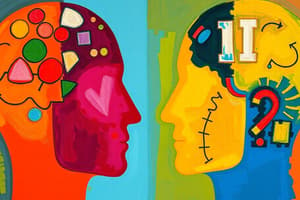Podcast
Questions and Answers
Which of the following biases involves prioritizing immediate rewards over future consequences?
Which of the following biases involves prioritizing immediate rewards over future consequences?
- Confirmation Bias
- Sunk Costs Errors
- Overconfidence Bias
- Immediate Gratification Bias (correct)
Which bias describes the tendency to dismiss information that contradicts one’s previous beliefs?
Which bias describes the tendency to dismiss information that contradicts one’s previous beliefs?
- Anchoring Effect
- Selective Perception Bias
- Framing Bias
- Confirmation Bias (correct)
What is the primary pitfall of the Anchoring Effect in decision making?
What is the primary pitfall of the Anchoring Effect in decision making?
- Fixating on irrelevant initial information (correct)
- Ignoring past experiences when making decisions
- Overlooking relevant long-term consequences
- Selecting details that confirm initial beliefs
Which bias is characterized by the error of believing past events were predictable after they have occurred?
Which bias is characterized by the error of believing past events were predictable after they have occurred?
What common decision-making error involves drawing false conclusions by perceiving similar situations as identical?
What common decision-making error involves drawing false conclusions by perceiving similar situations as identical?
Which decision-making error involves focusing on the most recent events and losing objectivity?
Which decision-making error involves focusing on the most recent events and losing objectivity?
What is the term for the decision-making error where individuals create irrelevant connections between random events?
What is the term for the decision-making error where individuals create irrelevant connections between random events?
In decision-making, which bias leads individuals to perceive situations through a lens that confirms their previous choices?
In decision-making, which bias leads individuals to perceive situations through a lens that confirms their previous choices?
Which bias involves the reliance on initial information while disregarding further relevant data?
Which bias involves the reliance on initial information while disregarding further relevant data?
What cognitive bias involves mistakenly believing that past events could have been anticipated only after knowing the outcome?
What cognitive bias involves mistakenly believing that past events could have been anticipated only after knowing the outcome?
Flashcards
Heuristics
Heuristics
Using simple rules of thumb to make decisions quickly, even if they aren't always the best.
Overconfidence Bias
Overconfidence Bias
Overestimating your abilities and thinking you'll always succeed.
Immediate Gratification Bias
Immediate Gratification Bias
Choosing immediate rewards, even if it means missing out on better long-term benefits.
Anchoring Effect
Anchoring Effect
Signup and view all the flashcards
Confirmation Bias
Confirmation Bias
Signup and view all the flashcards
Randomness Bias
Randomness Bias
Signup and view all the flashcards
Availability Bias
Availability Bias
Signup and view all the flashcards
Representation Bias
Representation Bias
Signup and view all the flashcards
Sunk Costs Errors
Sunk Costs Errors
Signup and view all the flashcards
Study Notes
Decision-Making Errors and Biases
- Heuristics: Using simplified rules of thumb to make decisions more quickly.
- Overconfidence Bias: Having overly positive self-assessments of ability and performance, believing one is more competent than they actually are.
- Immediate Gratification Bias: Prioritizing immediate rewards over future benefits or costs, choosing options providing quick, immediate satisfaction.
- Anchoring Effect: Focusing too heavily on initial information, refusing to disregard it even when subsequent data contradicts it.
- Selective Perception Bias: Interpreting information based on pre-existing beliefs rather than objectively, filtering data through biases.
- Confirmation Bias: Actively seeking information that supports existing choices and dismissing contradicting information, bolstering existing views.
- Framing Bias: Highlighting certain aspects of a situation while downplaying others, influencing decisions based on how options are presented.
- Availability Bias: Overestimating the likelihood of events based on recent occurrences, leading to biased decisions based on easily recalled information.
- Representativeness Bias: Drawing inaccurate comparisons based on superficial similarities, mistakenly assuming similar situations are the same.
- Randomness Bias: Attempting to find patterns where none exist in random events, searching for order in chaos.
- Sunk Costs Error: Continuing with a course of action due to prior investments, ignoring future implications (recognizing past investment is irrelevant to current decision-making).
- Self-Serving Bias: Attributing successes to personal attributes and failures to external factors, taking credit for successes and blaming others for failures.
- Hindsight Bias: Overestimating the predictability of events after the outcome is known, believing an event was more predictable than it was in reality.
Studying That Suits You
Use AI to generate personalized quizzes and flashcards to suit your learning preferences.




